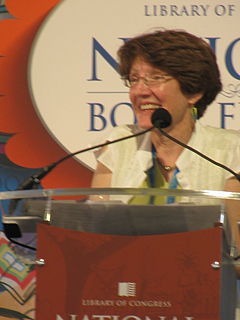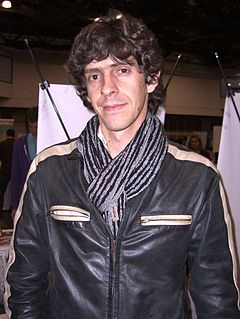A Quote by Gail Carson Levine
There's nothing wrong with reading a book you love over and over. When you do, the words get inside you, become a part of you, in a way that words in a book you've read only once can't.
Related Quotes
Sometimes I read the same books over and over and over. What's great about books is that the stuff inside doesn't change. People say you can't judge a book by its cover but that's not true because it says right on the cover what's inside. And no matter how many times you read that book the words and pictures don't change. You can open and close books a million times and they stay the same. They look the same. They say the same words. The charts and pictures are the same colors. Books are not like people. Books are safe.
Words are alive--when I've found a story that I love, I read it again and again, like playing a favorite song over and over. Reading isn't passive--I enter the story with the characters, breathe their air, feel their frustrations, scream at them to stop when they're about to do something stupid, cry with them, laugh with them. Reading for me, is spending time with a friend. A book is a friend. You can never have too many.
Great nations write their autobiographies in three manuscripts the book of their deeds, the book of their words, and the book of their art. Not one of these books can be understood unless we read the two others; but of the three, the only quite trustworthy one is the last. The acts of a nation may be triumphant by its good fortune; and its words mighty by the genius of a few of its children: but its art, only by the general gifts and common sympathies of the race.
How do I start writing a book? I sit there, I come up with an opening line, and then I go little by little. I'll wonder, Well, what's coming? And that goes right through to the very end. For over a dozen years now, I've had a recurring dream where I'm reading a book and the pages are blank, but as I read, the words come to exist as fast as my eyes can move. Strange, strange thing.
In reading we must become creators. Once the child has learned to read alone, and can pick up a book without illustrations, he must become a creator, imagining the setting of the story, visualizing the characters, seeing facial expressions, hearing the inflection of voices. The author and the reader "know" each other; they meet on the bridge of words.
For most people, what is so painful about reading is that you read something and you don't have anybody to share it with. In part what the book club opens up is that people can read a book and then have someone else to talk about it with. Then they see that a book can lead to the pleasure of conversation, that the solitary act of reading can actually be a part of the path to communion and community.
There are books full of great writing that don't have very good stories. Read sometimes for the story... don't be like the book-snobs who won't do that. Read sometimes for the words--the language. Don't be like the play-it-safers who won't do that. But when you find a book that has both a good story and good words, treasure that book.

































